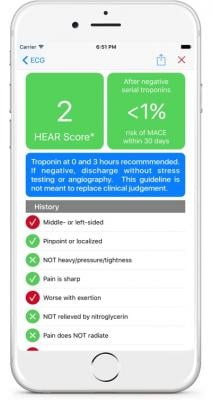
October 23, 2018 — Health informatics company Impathiq announced its Heart Pathway point-of-care clinical decision support tool was recently featured in the American Heart Association journal Circulation. The article, “Safely Identifying Emergency Department Patients with Acute Chest Pain for Early Discharge: The HEART Pathway Accelerated Diagnostic Protocol” appeared Sept. 28 in Circulation.1
This summer, Heart Pathway was successfully installed across the Boston-area Cambridge Health Alliance to streamline chest pain care in its emergency departments, which serve about 100,000 patients a year. The goal is strengthening patient care while reducing the number of low-risk chest pain admissions.
The Circulation article focused on results from a three-year clinical study of 8,474 adult emergency department patients. The study examined the safety and effectiveness of Impathiq’s health informatics technology as a means of providing point-of-care clinical decision support for patients presenting chest pain. As reported in Circulation, the implementation of Heart Pathway was associated with decreased hospitalizations, increased identification of index visit myocardial infarctions, and a very low death and myocardial infarction rate among low-risk patients.
“The most important finding is that the Heart Pathway identified [more] than 30 percent of patients as low-risk with an adverse event rate among low-risk patients of only 0.4 percent,” said Simon Mahler, M.D., Impathiq chief medical officer and lead author of the Circulation piece. He added, “Our study adds to a growing body of evidence suggesting that current ACC/AHA guidelines recommending stress testing or CT [computed tomography] angiography among low-risk emergency department patients are now obsolete.”
Mahler explained that a key takeaway from this study for physicians is that the Heart Pathway is safe and effective at identifying emergency department patients for early discharge without stress testing or coronary CT angiography. He added that the Heart Pathway identified more than 30 percent of patients as low-risk, with an adverse event rate among low-risk patients of 0.4 percent. Emergency department physicians should use an accelerated diagnostic protocol (ADP), such as the Heart Pathway, to guide their testing and disposition decisions, he said.
Heart Pathway is available on Cerner, Epic and other electronic health record (EHR) platforms and can be easily installed by health systems in a fashion similar to installing an app on a smartphone. Heart Pathway asks healthcare providers a series of objective questions about patient symptoms, risk factors and EKG findings. The tool then produces a risk score and recommendation, documenting results directly into the EHR while providing administrators access to valuable statistics to help standardize care across an entire system.
For more information: www.impathiq.com
Reference


 November 12, 2025
November 12, 2025 









